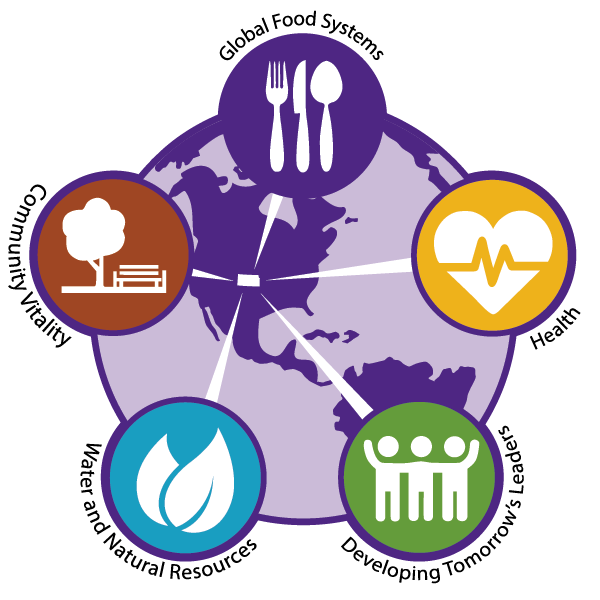Supporting our five grand challenges
K-State Research and Extension focuses on five challenges that directly or indirectly affect all Kansans. In 2019, one million contacts were made between residents of Kansas and K-State Research and Extension educators and scientists in these challenge topics. Learn more about each of these challenges below.

Global Food Systems
As the state's largest industry, agriculture drives the Kansas economy. In 2018, the agricultural industry contributed $67.5 billion to the Kansas economy, accounting for 40.4 percent of the economic output. Agriculture is the largest employer in the state, with 248,217 people accounting for 12.9 percent of the entire workforce. We are improving food and agricultural systems to feed the world's growing population, which will economically benefit Kansas.
What We Are Doing
- Developing and testing new crop, vegetable, and tree varieties that are suited to the Kansas climate.
- Reducing food waste caused by insects, poor storage, and processing techniques.
- Creating sustainable agricultural systems that intensify productivity.
- Identifying ways to maintain cattle rangeland threatened by variations in climate.
- Leading national and international teams to solve global food issues.
- Helping families stretch their food dollars.
Water and Natural Resources
Water quality in central and eastern Kansas and water quantity in western Kansas are important issues. Current irrigation trends could deplete 69 percent of the groundwater in the Ogallala Aquifer within 50 years, drastically affecting the Kansas economy. Sediment and silt are washing into large reservoirs that supply drinking water and recreation to many Kansans. Researchers and extension specialists are tackling these important issues.
What We Are Doing
- Breeding new drought-tolerant crop varieties that can be used for human and pet food, livestock feed, and fuel.
- Developing more efficient irrigation and water monitoring systems for home and farm use.
- Reducing runoff and sedimentation into reservoirs.
- Improving livestock genetics to increase feeding efficiency, which reduces feed and water needs.
- Working with the State of Kansas and partnering with stakeholders to develop a new 50-year water plan.
Health
Thirty-two percent of Kansas adults are obese, and 21 percent of Kansas children live in poverty. Targeting the diversity of Kansans, our programs address quality of life, healthy development, and health behaviors across life stages for all socioeconomic groups.
What We Are Doing
- Identifying and implementing practices to help prevent adult and childhood obesity.
- Providing options to help families and practitioners understand health-care choices for elderly Kansans.
- Sharing unbiased information about national changes in health insurance requirements.
-
Educating consumers on safe food handling, with information about food preparation, food preservation, food service and more.
Developing Tomorrow's Leaders
The complex global society of the future will require leaders with effective teamwork and communication skills. We need to prepare leaders of all ages, so they may contribute to a vibrant Kansas economy for years to come.
What We Are Doing
- Establishing a national model for bringing ethnically diverse families to 4-H.
- Adding value to the economy, 4-H members are twice as likely to attend college and pursue careers in science, engineering, and computer technology.
- Meeting the needs of military youth and their families at Kansas military installations and families of deployed members of the National Guard and Army Reserve.
- Training Kansans of all ages to be better citizens and leaders.
Community Vitality
When citizens are encouraged to combine their experiences and skills to work together, everyone in the community benefits.
What We Are Doing
- Living and working in every county, K-State Research and Extension staff engage community groups and share expertise from the three K-State campuses.
- Helping communities of all sizes maintain necessary services, such as grocery stores, that hire locally and generate local sales tax.
- Working directly with farmers, ranchers and families to develop better financial management practices.